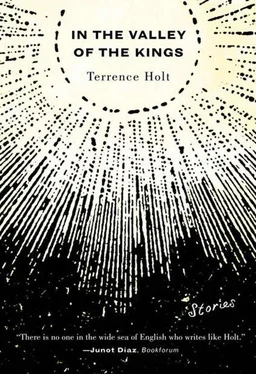We tracked Stern by the light of his main engine until he faded in the stars, and then by radar. He dropped rapidly astern, but before we lost him we learned his trajectory. He would fall into the sun sometime in May.
Naturally Peterson was hurt. He and Stern had trained together, shared Naval Academy ties and a series of backyard barbecues in Houston, of which there is still a Polaroid taped over the galley microwave: two men, two women, the men wearing dark glasses, the women with the loopy shut-eyed look that comes from too much sun and a fast shutter. Their arms are mostly hidden: here and there a hand appears, disjointed beside someone’s neck. There is no indication who took the picture, but in my imagination I am the photographer, and I think this prevents my tearing it up. I am surprised Peterson did not take it with him: it was Stern’s second wife, but Peterson’s first.
JUPITER WAS ACTIVE on the decameter band this afternoon, crackling and hissing like a witch and her cauldron. I piped it back into the hold all day while I worked there on one of the instrument packages. I have been dreaming again, a nightmare in which I am unable to awake. This makes the silence in the ship nerve-wracking: hence Jupiter. It reminds me of surf, and the hold can be my boathouse, my Ogygya. I may leave the radio on tonight, a mood record, like those used in nurseries to lull the babies with big soft noises — but something stops me. This is not a record.
At the suggestion of mission control, who want one instrument package sent to Io in place of the lost lander, I work in the lighted hold, holding on to handgrips with my toes as I modify the contents of the capsules — three featureless shells. They shine in the floodlights, smooth as pills rolling under your tongue, as hard to hold on to; so blandly polished their scale is as hard to grasp as their surfaces: from across the hold they can look as small as BBs, and the hold no wider than a mailing tube; sometimes they could be worlds, and at the hold-hatch I cling to the top of a well dropped down from heaven. The weightlessness does this.
I prefer to work inside them, where I curl comfortably. Their brushed-metal interiors give back no reflections (outside, the distortions are immense), only a dim shape that moves with me in the corner of my eye. Jupiter’s speechless hissing comforts me then, a voice tongueless as a radio wave. But I know when the cabin lights cycle off tonight and I float to sleep, I will not have the courage to keep a radio turned on in this ship. I possess already — perhaps I have dreamed it — a sense of how it will be when I wake suddenly to Jupiter’s voice pronouncing words, whole sentences, my name. I have enough trouble with my dream.
In my dream I am Peterson, or with him in his suit, and we are looking back at me, at the ship, as Peterson drifts away. His tether gone or never connected, tumbling through the stars revolving, looking out, looking back, we do not see my face in the cockpit window. In my dream I know the ship is deserted, and although it is I who have left it, I feel abandoned. Lights burn in every port along its length, and every port shows empty in the light. The hold stands open, open on a two-car garage, lined with lawn mowers, ladders. The cars are gone. Oil gleams darkly from the center of the floor, unreflecting. I change my mind. I am too sad, too tired or sick or small to go, and I want to turn back, but it is too late.
He took no means of rescue with him. Once he stepped outside the airlock unattached, once he jumped, he was committed. I think he knew the limits of his resolve, and surrendered himself to physical law before he could recant. In my dream, I open my mouth to speak but I cannot. There is no air. Tears puddle in my eyes but won’t fall. The absence of air, the suspension of gravity: I recognize these things. They return to me, as if I knew them once but long ago forgot. Breath, weight, those are spells finally broken, exceptions now set aside. This is real.
And only when I pass beyond denying this can I awake and remember the rest of the story.
I don’t know what woke me, the night Peterson left. The operation of the airlock is almost silent, and unless he made some sound, I cannot explain how I came to witness his leap of faith. I suspect he did signal me, deliberately, banging a wrench against a bulkhead until he saw me move, and then he turned to the open hatch, to crouch and spring. He was not far when I reached a porthole.
When I saw a spacesuit in free fall beside us, I turned to summon Peterson, to tell him there was a man out there, should we shoot a line? There was something terrifying about the absence of an umbilical between the suited figure and the ship: my mind refused to supply the missing connection. I was afraid to look behind me. Long seconds passed, in which the image of a human form, tumbling in somersaults, shrank. I floated, I froze, I gave no thought to rescue, to fear or pity, to anything but the gradual diminution of the figure, until I recognized his waving arms, and remembered the man they signified: I bolted overhand — away from the airlock, my eyes clenched shut. Blind momentum carried me to the cockpit, and the radio.
His frequency was full of speech when I found it. A sob rocked the room before I could back off the gain, and then, gasping, Help me, and, I’m sorry.
I sat in my couch and looked out the windshield, where the galaxy slanted across the ecliptic, between Gemini and Orion. I tried to find the lines between the stars that make a pair of twins, a hunter, but the figures crumbled, forming trapezoids, triangles, and finally single stars burning red, blue, gold at the bottom of the black.
“What’s wrong?”
Nothing moved.
“What is it?”
Only stars far away, and his voice coursing on unnoticing, his remorse weighting me, and I stayed and watched the stars beyond the screen and listened, as if the voice were a lost memory, a dead child, a dream.
And even when I moved to ask the proper questions, he did not respond. I knew his receiver was finally Off, and it didn’t matter. I saw nothing when I returned to the cabin port, but his voice remained, lingering in the radio, where it cried and cried. His signal followed, fading too slowly, for hours: time enough to return, and return, to the sorrow and the emptiness. He thought it was a trick, an exercise, a game, but he was wrong it’s only empty space and I’m sorry. Help me.
I switched it off.
SO I AM alone. Mission control approached me later with a surprising delicacy, a care to avoid certain words. Perhaps my inaction on Peterson’s behalf disturbed them: or perhaps out of the three they had most expected me to jump. They may no longer feel sure of whom they’re dealing with, and their delicacy is the caution demanded by a dawning sense of ignorance. Perhaps they no longer think me trustworthy. I think when they failed to take this up with me, they stopped being entirely candid.
THE SILENCE HAS burrowed deep into my dreams. In them, human forms flash by, and I see their faces turning as they pass, their lips moving, forming one word. Always it is the same word, but the sound I hear is not speech, nor is it ever the same. One figure passes, my mother, who tells me it is a car’s horn honking. My physics teacher says it is a hissing fire, a gas jet. To my dead brother, it is the sound of stones dropped in deep water. I call after them, but can make no sound at all until I wake, tangled in my sleep-tether, whispering “Wait” into an empty cabin.
I wake from dreams into memories, moments long submerged resurfacing. Standing shivering by a swimming pool, my shadow beside me on the concrete a thin wavering, listening as an instructor down a line of slick-skinned children gave a command, and all down the line they flung themselves into the water. I remember watching a silver bubble burst and quiver above me, shimmering into the quicksilver sky, and then the ecstatic inrushing of water as if I too were rising.
Читать дальше










